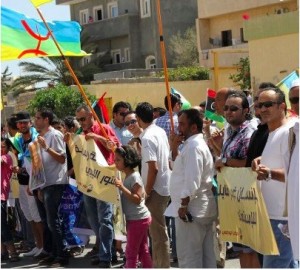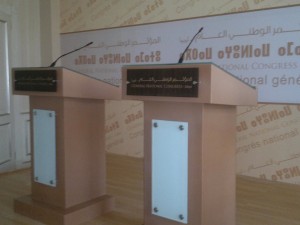By Nihal Zaroug.
Tripoli, 6 September:
A protest at Tripoli’s Palm City complex, which houses the United Nations offices in the city, was . . .[restrict]organized on 5 September by Amazigh (Berber) activists, seeking greater rights. They also want the inclusion of their language, Tamazight, in the Libyan constitution beyond simply being designated a national language.

There have been earlier Amazigh protests, notably a large demonstraion at the government’s headquarters in Tripoli in November 2011, after meetings with former NTC Chairman Jalil over key Amazigh requests ended in failure. There was also discontent over the lack of Amazigh representation in Prime Minister El-Kib’s government which had just taken office. Protesters demanded greater representation and constitutional rights.
The Libyan Amazigh National Congress issued a statement at the time calling for an end to all dealings with the NTC and government until their demands were met. Among these was the appointment of “two sovereign ministerial posts to the Libyan Amazigh people” and to make Tamazight an official language alongside Arabic.
The Constitutional Declaration of August 2011 made no direct provisions for the inclusion of Tamazight but identified Arabic as the official language. However, within the same article, a guarantee for cultural rights and national languages of “all the components of the Libyan society” was stated.
Many of the Amazigh people, after decades of systematic marginalization and repression, say that this clause is not enough to protect their culture and language. They insist that constitutional recognition of their language is crucial to ensure that their cultural identity is encouraged and safeguarded.
Amazigh culture has been able to flourish in post-revolution Libya, and signs of future progress are visible when seeing official banners include Tamazight but for Libya’s Amazigh, constitutional inclusion is the only gauge of success.

Now that Libya has an elected legislative assembly, amendments to the constitutional declaration can be expected.
In Morocco, the new constitution (via referendum) made Tamazight a state language alongside Arabic.
Whichever course Libya takes, the revival of Amazigh culture as a movement is in its infancy and will continue to make news. [/restrict]




